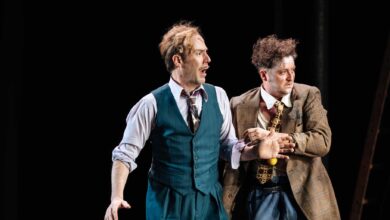Review: From Here To Eternity, Charing Cross Theatre
An exciting revival performed by an incredibly talented cast who demonstrate gorgeous harmonies, and beautiful, impactful staging, direction and choreography. summary
Rating
Excellent
From Here to Eternity is an emotional musical with a stunning score that questions the US Army and its soldiers through the lens of the attack on Pearl Harbour in World War II. Adapted from the classic novel by James Jones and the subsequent Oscar-winning movie, this production at Charing Cross Theatre is an exciting and inventive show that exceptionally demonstrates the vocal and movement talents of its cast.
Jonny Amies’ brilliantly portrays cocky soldier Maggio with a perfect level of comedy, relentless optimism, sarcasm, then devastating emotion. Meanwhile, Jonathon Bentley’s depiction of Prewitt as a determined, steadfast yet traumatised new transfer is fantastic. Both display spectacular vocal abilities in ‘I Love the Army’ and ‘Fight the Fight’ respectively, but what is most impressive – demonstrated throughout but particularly highlighted in these numbers – is the emotion and torment each character experiences. Similarly, Adam Rhys-Charles astounds as Warden, beautifully singing ‘At Ease’, and ‘Ain’t Where I Wanna Be Blues’ alongside Prewitt. Rhys-Charles’ tone is stunning throughout and his chemistry with Carley Stenson as Karen is intense and engaging.
Stenson and Desmonda Cathabel (playing Lorene) both portray the nuanced, difficult decisions women are forced to make to survive and highlight how in times of conflict it is often women that are left behind to try and make sense of it all. Although this show is predominantly male focused, the question of how much agency the lead women have in their lives, and the way in which the army and war influence and impact their ability to exert that agency, is fascinating. It is further highlighted as Karen and Lorene, along with Eve Polycarpou as Mrs Kipfer, expertly narrate the bombing of Pearl Harbour at the culmination of the narrative. Through the song ‘Boys of ‘41’, they tell the story of a war they have little ability to affect but that consequently changes the course of their lives. This concept of female agency is again brilliantly explored through Lorene’s relationship with Prewitt. Cathabel’s gorgeous vocals are demonstrated particularly well through the duet ‘Love Me Forever Today’ and her solo ‘Run Along Joe’, as she impressively performs a determined and complicated character.
Set in 1941, this production depicts outdated attitudes, which are reflected in the dialogue, and the unwillingness of the US Army to accept difference or dissent is consistently highlighted as its failure. The villainous portrayal of the Army officers and the entirely entrenched US Army system compares alongside the varying motivations each man has for enlisting. This negative depiction of the army contrasts with the commitment of principal characters to ‘G Company’ and to their roles as soldiers, and as this theme of conflicting and contradictory loyalties and beliefs is explored it helps the audience to further understand the motivations and decision making of the lead characters. The most powerful aspect of this show is its use of a multi-talented company of performers, whose harmonies are stunning. It also demonstrates the brilliance of clever staging done in the round that always feels natural and engaging. A sparse but effective set and excellent costumes by Stewart J Charlesworth enhance engaging storytelling, further supported by clever lighting design and visual effects from Adam King and Louise Rhodes-Brown. The use of military trunks throughout to create different pieces of set provides continuity, whilst innovative staging and direction by Brett Smock allow the ensemble performers to display brilliant coordinated chorography, still focusing the story on individuals at key moments.
Book by: Donald Rice and Bill Oakes
Lyrics by: Tim Rice
Music by: Stuart Brayson
Directed by: Brett Smock
Choreography by: Cressida Carré
Set and Costume Design by: Stewart J Charlesworth
Musical Director, Orchestrations and New Musical Arrangements by: Nick Barstow
Lighting Design by: Adam King
Sound Design by: Chris Murray
Video and Projections Design by: Louise Rhodes-Brown
Produced by: Aria Entertainment, Bill Kenwright and Heartaches Limited
From Here To Eternity plays at Charing Cross Theatre until 17 December. Further information and bookings can be found here.







